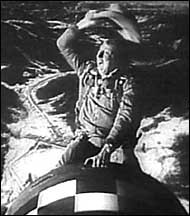
MP3: Sun Ra Arkestra - Nuclear War
There has been quite a lot of talk about Iran in the North American media these days. We hear many things: that they are bellicose fundamentalists intent on destroying the west; that they have nuclear ambitions which threaten every nation on earth; that they harbour terrorists and train them for future activities. The new mantra down south seems to be one of preemption, a get 'em before they get us attitude.
It might seem dreadfully obvious, but such talk in the media would likely convey to Iran an idea that the only way to defend itself against American aggression would be a strong nuclear arsenal. You really do have to love catch-22 situations, especially in regard to lobbing nukes around. The seeming inevitability of the situation evokes an almost religious fatalism, and that is precisely what hardline American and Iranian officials are exploiting in their separate camps. According to an article published in the New Yorker, President Bush is absolutely convinced that Iran is going to get the bomb" if it is not stopped, and that he must do "what no Democrat or Republican, if elected in the future, would have the courage to do ... saving Iran is going to be his legacy." Since it is highly unlikely that George Bush was actually elected in either 2000 or 2004, this statement is perhaps the most disturbing bit of information ever to emerge from the White House.
The U.N. Security Council is also concerned with Iran, as it is concerned with any member nation which seems to be pursuing nuclear ambitions (except the US of course, which has had free reign to develop weapons of mass destruction; will we one day see America sanctioned for its militarism?). President Bush has repeatedly stated that his administration is pursuing every diplomatic means at its disposal (importantly, the CIA describes this as "inaccurate", but doesn't elaborate). It should here be noted that currently the US military is staging a continual series of military training exercises - such as strategic nuclear bombing simulations - within arms' reach of Iran. Of course, then there's that grand military exercise which is the occupation of Iraq.
Interestingly enough, Iraq seems as a quasi-ironic precursor to a more open form of regime change, ie nuclear war. Talk about Saddam Hussein and his government has adequately diluted the debate surrounding American involvement in the Middle East. No longer is the Palestinian-Israeli issue at the forefront; similarly pushed aside is the influence of American foreign policy on Lebanon and Syria, among others. We now have the great and secret show which is the trial of Saddam Hussein to occupy the foreign correspondent sections of our newshours and RSS feeds. What we are in fact getting is the classic bluff-and-swap manoeuvre. The White House is not filled with idiots, despite the child-king who is their leader. It was known for a long time that Hussein posed little threat to world peace. After all, it was America which sold Iraq much of its military arsenal. It seems much more likely that Iraq was invaded to secure a large oil deposit while simultaneously granting a second strategic foothold (after Israel) in the Middle East.

Seymore Hersh stated that in conversation with several high-ranking civilian staffers at the Pentagon, Iran's President Mahmoud Ahmadinejad was repeatedly described as "the next Adolph Hitler". Here's the switch after the bluff. Public debate concerning tyrants and monsters such as Hussein and Hitler, when breathed in the same utterance as Ahmadinejad, serves the purpose of rhetorical contingency that most listeners find captivating. Of course Ahmadinejad is bad, the public will say, lacking all proof to that effect other than I don't like Hitler.
According to several Pentagon-affiliated sources, America is quite advanced in the planning stages for military operations in Iran. We should not assume this operation to be as 'bloodless' as Iraq (to the 50,000 dead Iraqis, please pardon the use of this term). After all, after wiping out Iraq's army in 1991, military strategists knew full well the extent of Iraq's military capacity - none. In regard to Iran, the question is a lot more open. Iran does indeed have a standing army which is decently equipped. As well, there can be no denying that Iran has the potential for nuclear deployment.
In light of this, Pentagon strategists have come up with an all-or-nothing solution. Conventional and chemical weapons, such as those currently in use in Iraq, will not be able to decisively annihilate Iran's geographically dispersed nuclear processing facilities, nor will they be able to penetrate Iran's purported underground uranium enrichment facilities. Some estimates posit that more than five hundred distinct sites would have to be rapidly destroyed to ensure Iran's submission to American nuclear authority. Consequently, only the nuclear option remains to ensure that Iran doesn't respond to a military strike with a nuclear counter-attack.
In light of this might we surmise about a statement in the Project for a New American Century - that wonderful and terrifying in situ holocost museum - released a little more than a week after the 9/11 attacks. To ensure American hegemony over key material resources, namely oil, water, and uranium, and continue the war on terrorism, the country would have to escalate warfare considerably. Winning the war on terrorism would likely "require the United States to engage a well-armed foe". Just to remind you, the signatories and principal architects of PNAC are currently members of George W. Bush's administration.
Patrick Clawson of the Washington Institute for Near East Policy is quoted in the New Yorker as saying that "we have to be ready to deal with Iran if the crisis escalates....This is not like planning to invade Quebec." So the waters of an invasion into Iran don't get diluted by another bluff-and-switch potential, I'll leave that last somewhat ominous Freudian slip for a future article.
1 comment:
ever wonder if he's the anti-christ?
we will discuss when i return home. see you in a week.
angela
Post a Comment